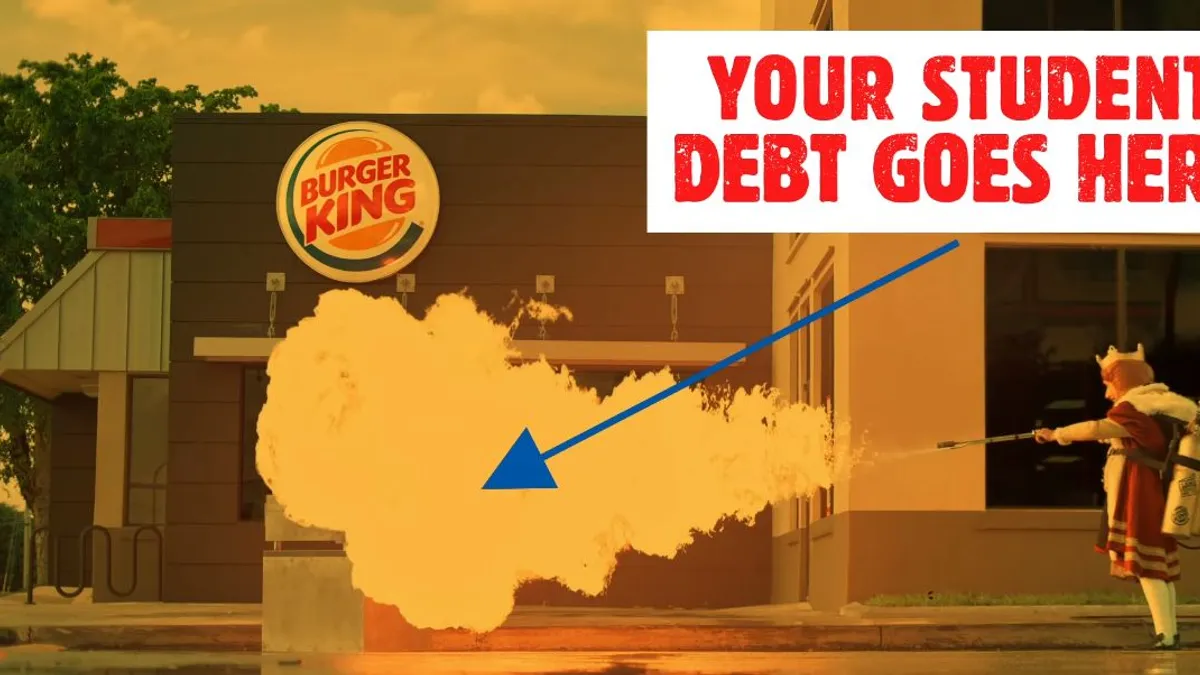Dive Brief:
- Burger King is giving customers with student loans the chance to pay off their debt through its "Whopper Loans" sweepstakes, which runs through June 6, the fast food chain announced on Twitter last week.
- The program pledges up to $250,000 toward debt relief, with the grand prize winner receiving as much as $100,000 and 300 weekly winners getting up to $500 each. The program is run through the Navient-owned Earnest, a San Francisco-based lender founded in 2013 that offers student loan refinancing.
- Participants can enter the competition by placing orders through the restaurant chain's mobile app or by mailing in an entry card.
Dive Insight:
Burger King is playing on a popular topic to draw in customers. And indeed, there's no short supply of potential customers with student loans. The nation's total student loan debt load has soared to more than $1.5 trillion, with the average borrower owing nearly $30,000.
Student loans have grown with tuition prices. Over the past decade or so, student debt shot up by 157%, compared to a 52% increase in auto loan debt and a 1% decrease in credit card and mortgage debt, according to the Los Angeles Times.
Though its campaign has garnered considerable media attention, Burger King is not the first company to use student debt relief as a marketing ploy.
Last year, Natural Light, an Anheuser-Busch beer company, announced it was giving away $1 million to help 25 customers pay off their student loans. And this year, the company revived the sweepstakes, promising to give away $1 million each year to borrowers for the next decade, CNBC reported.
Even a game show has emerged in response to high student debt. "Paid Off" pits three student loan borrowers against each other in a trivia contest, with the winner going home debt-free.
Adam Harris, a staff writer for The Atlantic, contends marketing tactics like Burger King's highlight the need for a "systematic fix" to ballooning student debt. "This genre treats the idea of debt as a sweepstakes that only a lucky few can win," he writes, adding, "the fear is that people will get accustomed to it."
Defaulting on loans — which nearly 40% of borrowers are expected to do by 2023 — can have far-reaching consequences. Often, it can sink a borrower's credit score, resulting in higher interest rates, a bigger overall balance and delays on big purchases like a home, CNBC reported.
There are disparities in who defaults on their loans, however. Defaulters, for instance, tend to live in predominantly black and Hispanic neighborhoods, according to CNBC. And black graduates tend to hold nearly twice as much student debt as white graduates four years after receiving their diploma, according to a 2016 Brookings report.
Democratic presidential hopefuls have put forth a few ideas to address the issue. For example, Massachusetts Sen. Elizabeth Warren proposed canceling up to $50,000 in student loan debt for individuals with household incomes under $100,000.
And several candidates have backed the Debt-Free College Act, which responds to criticisms of many current free college programs by covering additional college costs such as transportation and housing.











